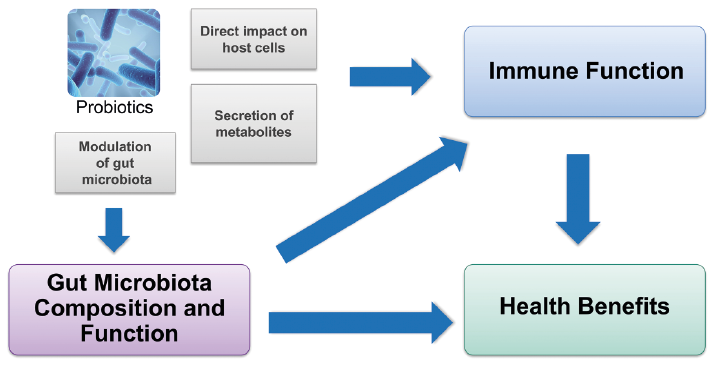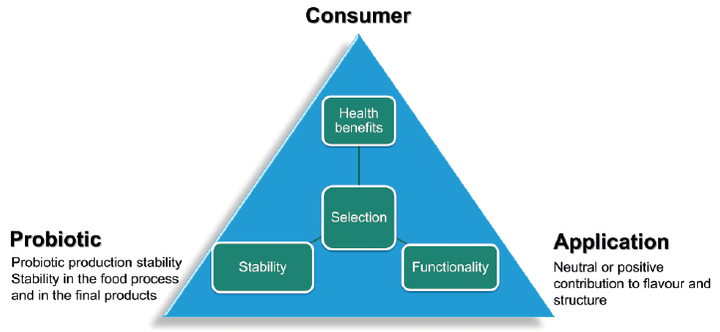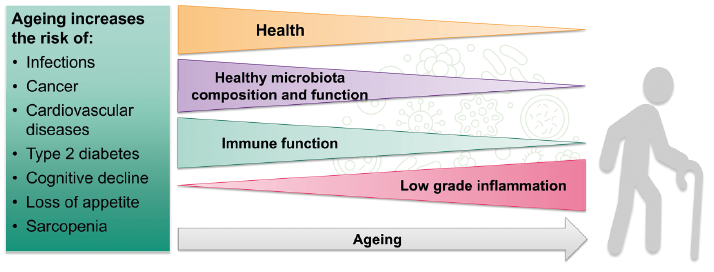AGE WELL
WITH A TARGETED
PROBIOTIC


REFERENCES AND NOTES
- United Nations: https://www.un.org/en/sections/issues-depth/ageing/
- Gensollen T., Iyer SS., Kasper DL., and Blumberg RS. Science (New York, N.Y.), 352(6285), 539–544.
- Miller LE., Lehtoranta L., Lehtinen MJ. Nutrition Research, Vol 64. April 2019, 1-8.
- Ahmed M., Prasad J., Gill H., Stevenson L., Gopal P. J Nutr Health Aging. 2007 Jan-Feb;11(1), 26-31.
- Lahtinen SJ, Forssten S, Aakko J, Granlund L, Rautonen N, Salminen S, Viitanen M, Ouwehand AC., Age (Dordr). 2012;34(1), 133–143.
Good immune health begins and ends in the gut. Today scientists are well on the way to identifying the best probiotic strains to keep the ageing population healthy – bringing major opportunities for the food industry to pursue. Whether you look at it from a social, economic or personal perspective, there are many good reasons for wanting to do that.
Since late 2018, the UN reports that people aged 65+ have outnumbered children below the age of five for the first time in world history. From now until 2050, the number of people aged 80 or above is expected to triple from 143 million to 426 million (1).
Many countries are already experiencing the social and economic impact of the ageing population in terms of growing health care costs and a reduced workforce to pay the bill.
At a personal level, older citizens may find that declining immune health has serious implications for their quality of life.
At a time where many no longer see age as a barrier to an active lifestyle, the possibility that probiotic-enriched food could help maintain health and vitality through optimised microbiota is welcome. But just how close are we to proving that probiotic supplementation actually works? Let’s begin with a look at what we know.
ELDERLY OUTNUMBER CHILDREN
Today, evidence points to the loss of cellular immune functions in elderly as a primary improvement target for specific probiotics. The functional decline includes decreased phagocytosis – that is, the ability of immune cells to eliminate potentially harmful bacteria – and a reduction in natural killer (NK) cell activity, which helps fight viral infections and cancer.
Published in 2019, a systematic review and meta-analysis of 18 controlled studies concluded that short-term probiotic supplementation enhances the cellular immune function in healthy elderly people (3). The studies, which included 733 subjects aged between 62 and 103, focused on a range of probiotic strains, using dairy products and dietary supplements as the probiotic vehicle.
The most studied strains were Bifidobacterium lactis HN019 and Lactobacillus rhamnosus HN001, which proved effective in enhancing cellular immune functions, unlike some of the other probiotics studied. This highlights the importance of a clinically proven benefit when selecting probiotics for food products.
EVIDENCE OF ENHANCED IMMUNITY
One clinical study in New Zealand investigated the impact of B. lactis HN019 on gut microbes during and immediately after a four-week supplementation period, where subjects consumed a low, medium or high dose of the strain in a 250ml serving of milk (4). Here, levels of bifidobacteria and lactobacilli increased significantly regardless of dose. Another important finding was a decline in coliforms – regarded as opportunistic pathogens – in the medium and high dose groups.
In Finland, DuPont Nutrition & Biosciences conducted a clinical study of L. rhamnosus HN001 and L. acidophilus NCFM in combination in cheese (5). Consumption of these strains not only resulted in significant changes in the population of intestinal lactobacilli in the elderly subjects, but also to reduction of levels of Clostridioides difficile (formerly Clostridium difficile).
Such findings about microbiota and immunity hint at a promising future for specific probiotics in foods for senior immune health. However, there is still a need for more clinical studies that document a direct improvement in health markers when probiotics are consumed.
The current booming interest in gut microbiota suggests that such clinical studies may not be long coming. In the time ahead, it is probable that new beneficial strains will emerge for commercial consideration.
IMPACT ON BENEFICIAL GUT MICROBES
Until now, dairy products have been the traditional choice of probiotic carrier. Today, other strong candidates are emerging – such as ice cream, chocolate, snacks, beverages and fermented plant-based products. More potential exists within the budding field of personalised senior nutrition. It is, for example, quite easy to imagine that analyses of an individual’s microbiota could, in the not too distant future, provide the basis for including certain probiotic foods in the diet.
The final hurdle concerns the legislation around probiotic claims on food product labels, which already varies widely from market to market. Good probiotic suppliers are equipped to advise on this area. However, while efforts continue to document and develop probiotics for senior immune health, both the scientific community and food industry should work with national food safety and health authorities to ensure the necessary regulatory framework is in place.
The ultimate goal is clear – to provide senior consumers with a choice of well-documented, effective and appealing probiotic foods that can help them lead an active, healthy life in their later years. As the journey of scientific discovery progresses, it becomes increasingly certain that the essence of good health lies in the gut. The job of targeted probiotics is to keep that essence alive.
OPPORTUNITIES FOR NEW PROBIOTIC CHOICES
In addition to establishing the health effects, probiotic manufacturers have an important job to do in ensuring the viability of probiotics during shelf life and supporting their incorporation in a range of food products (Figure 3). Only those strains stable enough to survive the rigours of food processing will make it to market launch – regardless of the health benefits they provide.
Once the probiotic documentation is in place and stability secured, food manufacturers can look forward to major opportunities to develop new probiotic brands for the growing senior market.
Among elderly consumers, there are already some who express a preference for everyday foods with a valid health claim on the label, reducing their need for dietary supplements.
The key to success will lie in the manufacturers’ ability to create health-enhancing probiotic foods that deliver the taste and texture elderly consumers enjoy while accommodating those with smaller appetites or chewing and swallowing difficulties.
BEYOND HEALTH BENEFITS - PROBIOTIC STABILITY AND FOOD APPEAL
Clinical studies have shown us that the interplay between the immune system and gut microbiota starts from birth. Microbiota impact the development of the immune system in early life and help keep it in balance during adulthood (2).
We also know that the amount of beneficial bifidobacteria and lactobacilli naturally present in the gut decline simultaneously with the immune system function during ageing (Figure 1). The association between lower levels of bifidobacteria and lactobacilli in elderly and an increased susceptibility to illness is similarly well established.
Scientific research clearly indicates that probiotic supplementation could be beneficial for elderly immune health by modulating the gut microbiota and supporting the immune function (Figure 2). However, as not all probiotics are the same, considerable research is necessary to find the most beneficial strains. Over the past two decades, clinical studies have brought us much closer to understanding their effect on the immune function and microbiota of elderly individuals.

Figure 2. Probiotics influence microbiota composition and function. Gut microbiota and probiotics may also directly impact the immune function, resulting in benefits for immune health.

Figure 3. Key criteria for selecting probiotics for health products. The ideal probiotic should be stable in food, have a neutral or positive impact on flavour and provide documented health benefits for consumers.

Figure 1. Ageing is associated with an increased risk of infectious and chronic inflammatory diseases. Science has also shown a parallel loss of beneficial microbes, declining immune function and a higher incidence of inflammation.
THE LIFELONG LINK WITH THE GUT
MARKUS J. LEHTINEN
LIISA LEHTORANTA
DuPont Nutrition & Biosciences | Finland
More...
HEALTHY AGEING
ABOUT THE AUTHORS
Dr. Markus Lehtinen holds a Principal Scientist position at DuPont Nutrition & Biosciences and leads research on probiotics on immune health at Global Health and Nutrition Science team Kantvik Finland. For the past 8 years his work has focused on the clinical health efficacy research of probiotics and other active ingredients on maintaining and improving immune health. He has a BEng on Bio and Food Technology, BSc/MSc on Biochemistry and PhD on Medicine and 10 years of experience in academic research on innate immunity. Dr. Lehtinen has published 30+ peer-reviewed articles in the areas of immunology, microbiology and biochemistry.
Dr. Liisa Lehtoranta is an R&D Manager at DuPont Nutrition & Biosciences, where she and the team investigate the health effects of probiotics, prebiotics, and other functional ingredients in preclinical and clinical settings. Dr. Lehtoranta holds a PhD degree in Microbiology from the University of Helsinki. She has over 10 years of experience in scientific research from academia and the industry with main focuses on probiotics and the effects on microbiota and health.






